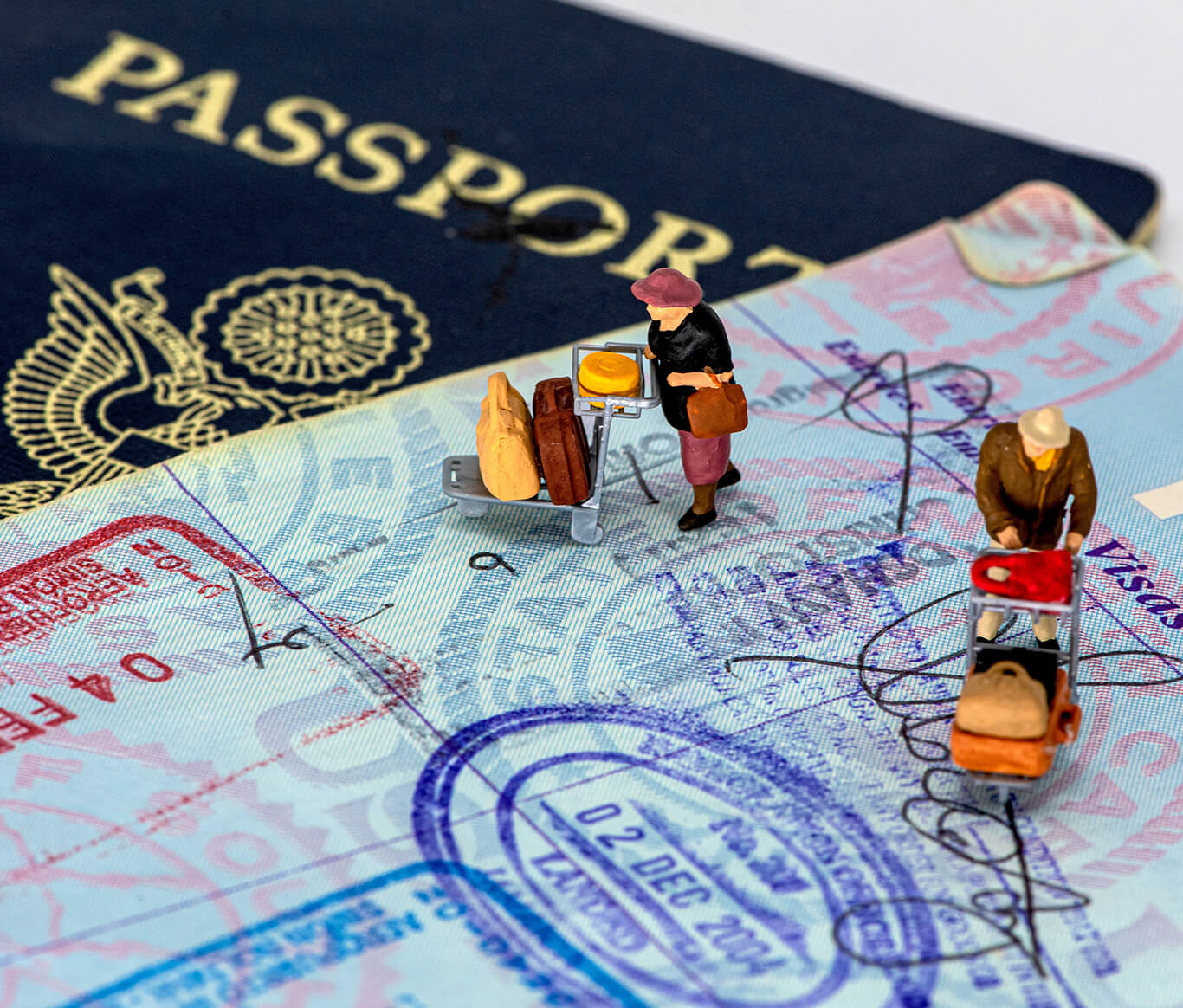Unwilling to settle for the circumstances they were born into, bright minds from seemingly disadvantaged countries identified pools of opportunities across their borders, and set out to make their mark in the world. However, they had to apply for a visa each time they flew to a different nation. Taking into account the lived-in experience of many over time, it came to light that the process was time-consuming, expensive, and offered little to no guarantee. The constant reapplication of a visa turned out to be an arduous affair, and so, the practice was deemed unsustainable in the long run. It is then the prospect of dual citizenship came about, providing a possible solution for frequent travellers.
Going Global!
In the 1970s, after years of back and forth, the concept of attaining dual citizenship came around again when the consensus against it finally began to erode. As of 2021, the trend seems to be catching steam. Holding the passport of certain countries gives one the ease of traveling to many nations without having to apply for a visa each time one decides to travel. This not only saves waiting time but also a lot of money. And because one is ready to travel on the go, it also helps people grab opportunities that they would’ve otherwise had to let slide by.
Furthermore, holding a powerful passport with an excellent credit rating gives one the freedom of global mobility, a benefit that can be milked by ‘blue-ticked’ social media influencers, business owners, and avid travellers. One can move freely between the two countries and several business opportunities open up. While different countries have different strengths in their travel documents, the top countries which typically rank high have visa-free entry rights to 180+ countries. These include many of the most developed European countries, including Cyprus and Malta, which also form part of the Schengen area, where no border checks happen. Just holding a national ID of a particular State is enough.
While different countries have different strengths in their travel documents, the top countries which typically rank high have visa-free entry rights to 180+ countries
On the lighter side, a second passport also eliminates the exasperation caused by standing in queues at immigration counters and consulates and, more importantly, the constant fear of security. People can seek diplomatic assistance from representatives from both countries while present in a third country. A sound second passport from a stable country can be life-saving if one’s homeland is under distress.
Although attaining citizenship costs a fortune, having the right to reside in a country other than your own is incredible insurance. While members of the EU are more expensive, a Bulgarian passport is more affordable and gives decent traveling options. If you opt for a full-blown EU citizenship, it could give you the right to settle down in 32 countries, which could feel no less than a superpower!

Breaking Down ‘Investment Migration’
To kickstart your journey towards possessing a dual citizenship, it is imperative to understand investment migration. It is the broad umbrella under the ambit of which fall the two ways of procuring second citizenship, namely – Citizenship by Investment and Citizenship by Residence.

A global leader in investment migration, Henely & Partners is a citizenship and residence advisory firm based in London. The company’s Residence and Citizenship Practice Group advises individuals and their clients such as law firms, banks, and family offices on alternative residence and citizenship. According to an opinion of The Guardian, “the company has arguably invented the modern ‘citizenship planning’ industry.”
Paddy Blewer, the Director of Henely & Partners, says, “This is about diversifying portfolios, investing and operating globally, and creating a new inheritance and identity for the family.” He also emphasizes that although people from countries like Bangladesh, China, Middle east are more inclined, the firm has also seen an increase in interest from individuals in countries like the United States and Brazil who already have “premium” passports. In fact, Blewer reports a 700 percent increase in Americans inquiring about investment migration programs.
Taking A Closer Look
Several factors need to be considered before going ahead with the procurement of a second passport, your personal reasons for it being of key importance. While getting yourself a second passport may now seem secured by bureaucracy and careful administration, it is important to stay wary of lawyers, organizations, and agencies that might charge a fee higher than is required. The cost can vary dramatically depending on the country, ranging from $100,000 to millions of euros. Some countries require a combination of non-refundable contributions and minimum real estate purchases, and some also specify the type of real estate. There are nearly 100 different countries worldwide offering these citizenship programs, so getting professional advice from a firm like Henley & Partners is a must if you’re seriously considering making this international investment.

The firm has seen an uptick across the board, and Blewer says that they’ve seen significant growth in the citizenship and residency programs from Malta, Cyprus, Montenegro, Portugal, Greece, and the Caribbean, especially St. Lucia. Blewer notes that their clients don’t necessarily move to these countries; “some people invest in programs run by these sovereign states only to acquire citizenship and/or residence rights offered by these sovereign states, with no plans of permanently living there.”
The United Arab Emirates (UAE) also announced earlier this year, that the Emirati Nationality Law had been amended to grant citizenship to expatriates. The UAE’s Prime Minister and ruler Sheikh Mohammed bin Rashid Al Maktoum said this change was made to attract and retain individuals with specialized skills. “We adopted law amendments that allow granting the UAE citizenship to investors, specialized talents & professionals including scientists, doctors, engineers, artists, authors, and their families. The new directives aim to attract talents that contribute to our development journey,” he tweeted.
The UAE passport allows visa-free entry to 173 countries where people can live, work and open a business in the UAE without restrictions. In recent years, a larger percentage of the UAE’s affluent immigrant population have been applying for second passports in other foreign nations. The use of services such as ‘citizenship by investment’ programs has skyrocketed.
Boon or Bane
The procedure for obtaining dual citizenship is long, complex and expensive, and may require the assistance of an immigration lawyer. The bearer of a second passport also becomes bound by the laws of two countries. Apart from costing a fortune, one cannot deny that holding a dual citizenship also presents other problems like double taxation from both countries. Angelina Jolie, Arnold Schwarzenegger, and several other public figures hold a second passport that not just benefits them with the flexibility of travel and work but also expands their worth as global stars.
Angelina Jolie, Arnold Schwarzenegger, and several other public figures hold a second passport that not just benefits them with the flexibility of travel and work but also expands their worth as global stars
In 2014, Pakistan-born activist Malala Yousufzai joined an eminent list of Honorary Canadian Citizenship awardees when she was offered the same by the government of Canada, which she graciously accepted. Extended to only six individuals from its inception, it is important to note that the citizenship bestowed by the State is purely symbolic in nature. Honorary citizens do not have any rights or privileges associated with Canadian citizenship, such as a passport or the right to vote.
Two faces of the same coin, the process is not devoid of loopholes that are increasingly exploited by wealthy fraudsters on the run from law back in their home countries. According to Arton Capital, a global citizenship financial advisory services firm based in Montreal, Canada, investors in the Caribbean CBI schemes must “be of outstanding character, hold no criminal record (and) have excellent health.” The hitch, however, is that not all countries properly vet applicants, or they may deliberately turn a blind eye. Money laundering fugitives find a way into the new country despite the red flags they raised during the vetting period. Fishing them out then for crimes like embezzlement in their native countries is the task of squads for years together. Often referred to as ‘Golden passports’ by critics, they are obtained mostly through citizenship by investment schemes.

Worth The Effort
Despite the cons, ‘Citizen of the Globe’ is a concept many people have warmed up to. Instead of making luxury-based investments, people aspire for a second citizenship to escape the clutches of political instability, more expansive business opportunities, ensuring a better future for their family, and securing their plans after retirement.
With the pandemic of 2020 still continuing, rules of business and governance have altered forever. Although the concept is viable only for the crème class for now, it helps in expanding their horizons, thus elevating the overall functioning of the world. Welcome to the next level, that of being a citizen by choice!
General Stats
- Close to 90% of UAE’s population comprises of foreigners who are not local to the land. The percentage is huge which points to the fact that if dual citizenship laws were more inclusive and relaxed, a lot more people would have liked to get dual citizenships.
- By 2020, 76 percent of countries maintain a more tolerant approach towards dual citizenship and allow citizens to voluntarily acquire the citizenship of another country without automatic repercussions for the citizenship of origin.
- 66% of the states without a dual citizenship restriction allow citizens to voluntarily renounce their citizenship after acquiring another citizenship. In comparison, 10% of them do not let their citizens renounce their citizenship.
- In 2019, EU Member States granted citizenship to 706,400 people having their usual residence in the EU territory, an increase of 5 % compared with figures from 2018.
- Of those acquiring citizenship of an EU-27 Member State, 85 % had previously been citizens of non-EU countries. Of these, citizens of Morocco made up the highest numbers, followed by citizens of Albania, the United Kingdom, Syria, and Turkey.
- Most new citizenships in 2019 were granted by Germany
- (132,000 or 19 % of the EU-27 total), Italy (127,000 or 18 %), France (109,800 or 16 %), Spain (99,000 or 14 %) and Sweden (64,200 or 9 %).
Age-Based Stats
- In 2019, the median age of persons acquiring citizenship in the whole of the EU was 32. The Member State with the lowest median age was Greece; half of its new citizens were younger than 18. The highest median age (44) was in Lithuania.
- In 2019, almost 40 % of persons granted citizenship of an EU-27 country were younger than 25 years, and around another 40 % aged 25 to 44, while those aged 45 or over accounted for 20 %.
Gender-Based Stats
The distribution by gender shows a slight predominance of women (52 % against 48 % men). Acquisitions of citizenship by women outnumbered acquisitions by men in all but eight of Member States (Belgium, Bulgaria, Greece, Hungary, Romania, Slovenia, Slovakia, and Sweden). The highest proportion of citizenship acquisitions by women was recorded in Croatia (59 %). The country with the highest share of acquisitions by men was Romania (64 %).
(Source: Bloomberg + Maastricht Centre for citizenship, Migration and Development, Maastricht University + Europa Stats explained)
